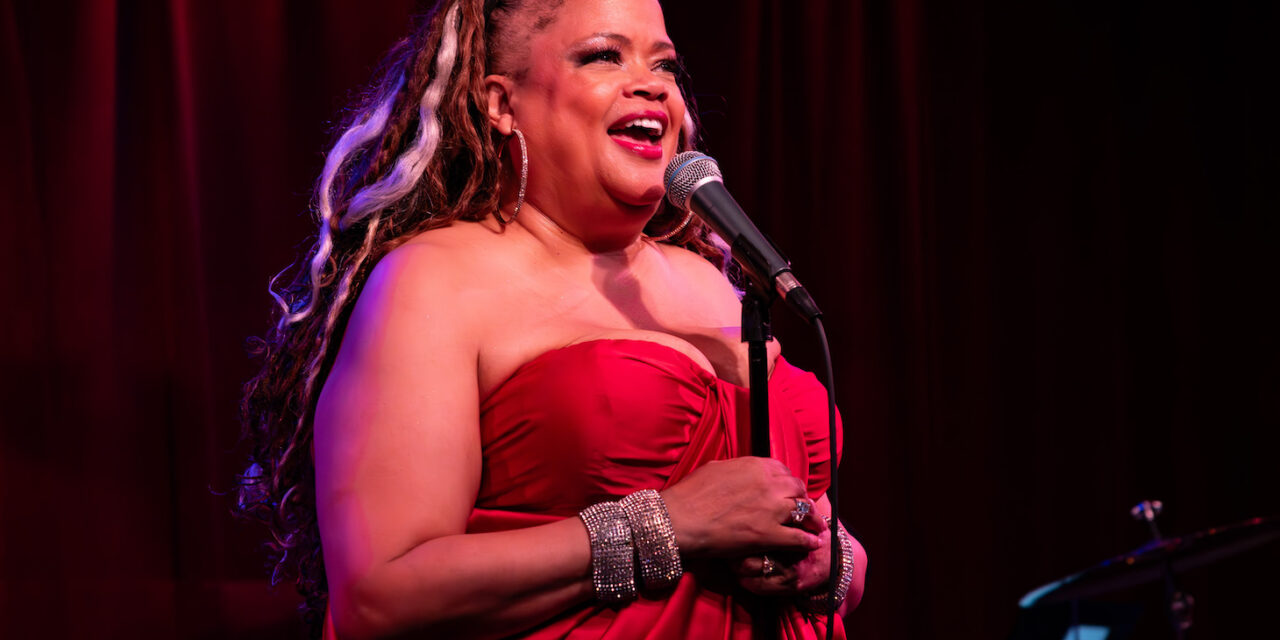By Marilyn Lester . . .
In what was possibly one of her most magnificent cabaret shows to date, Natalie Douglas proverbially blew the roof off Birdland with A 60s Songs Juneteenth Jubilee. The power of her golden voice, the on-point song choices, the narrative, and a quartet of master musicians, combined to create a deeply emotional experience of entertainment laced with social consequence. “It’s an artist’s duty to reflect the times in which we live,” said Nina Simone, as quoted by Douglas. This concert surely met that criterion—and it wasn’t a one-off. Douglas has long been a voice for social justice as well as an entertainer. This was her second annual Juneteenth Jubilee at Birdland.
Dressed in a bright red frock, the official color of Juneteenth, Douglas was, as always, a sparkling, cheery, humorous and welcoming presence. It’s hard to resist her charms, but why would you? In her music, in the choices and lyrics, she gets down to business; her on-point deliveries tell all that there is to know about her deeper intentions. In this case, Juneteenth, a very new Federal holiday, the focus was multipartite, of past and present pain coupled with hope and celebration. Of course, we learned about the history of Juneteenth. The Emancipation Proclamation went into effect on January 1, 1863, but compliance wasn’t immediate. Flash forward to the end of the Civil War, when Major General Gordon Granger traveled to Texas to proclaim freedom there on June 19, 1865. The holiday has been celebrated since, mainly in Texas (until recently) and, originally, mostly church-based.

And so this particular Juneteenth Jubilee began with that spiritual emphasis, such as in “I Wish I Knew How It Would Feel To Be Free” (Dr. Billy Taylor) and “Farther Along” (W.A. Fletcher). But ever the educator, as well as possessing a wide vision of equality and humanism, Douglas broadened her choices to include music about labor and LBGT+ rights before coming in to hit hard about racism and the particulars of the Black experience. One of the most “fun” and pointed songs of the evening was “Down at Stonewall” (Jallen Rix), a catchy tune with a killer refrain in “I saw Jesus down in Stonewall” (“meanwhile, in the Church, Jesus is a no-show”).
Well-positioned in the middle of the set were two of the most gut-wrenching songs of the evening. When the Reverend Doctor Martin Luther King was assassinated in 1968, musician Gene Taylor committed his immediate reaction to paper. Eventually, those words became the lyric to “Why?” (The King of Love Is Dead). In 1958, 14-year old Emmett Till was abducted, tortured and lynched in Mississippi, after being falsely accused of offending a white woman, Carolyn Bryant. Bob Dylan’s “The Death of Emmett Till” was heart-rending, powerfully delivered by Douglas, who smartly followed it up with one of her staples, Nina Simone’s emotional cry of outrage, “Mississippi Goddam.”


Finally, entering into a rising arc of joy, and in tribute to the recently passed force of nature, Tina Turner, Douglas belted out a superb “River Deep, Mountain High” (Phil Spector, Jeff Barry and Ellie Greenwich). Ending with a few bars a cappella of the traditional “This Little Light,” Douglas launched into a rousing “Now!,” which celebrates the collaboration between Blacks and Jews in the Civil Rights movement. The lyric was written by Adolph Green and Betty Comden to a Jule Styne arrangement of the traditional “Hava Nagila.” These dynamic last two tunes had the audience (sold out and with many cabaret luminaries present) clapping and rockin ‘. Truly, this Juneteenth Jubilee was a concert for the ages.
Last, but certainly not least, the show owed a large portion of its success to the all-star band backing Douglas. Her music director of 26 years, Mark Hartman, was absolutely on fire. His arrangements were perfection and his pianistic skills knew no bounds, with glissandi and other techniques bringing the music alive. He inhabited the notes and the tunes in much the same way as a singer can inhabit a lyric.
A terrific touch was Brian Nash on keys, emulating a Hammond B-3, the classic organ of R&B, funk and rock, among other genres. His skills brought another dimension to many of the tunes. The two musicians powering the rest of the rhythm section, Jonathan Michel (bass) and Kakubu Griffin (drums), completed the tight unit. And it was a joy to hear these cats sing backup on a few of the numbers.
Natalie Douglas – A 60s Songs Juneteenth Jubilee took place on Monday, June 19 at Birdland Jazz Club (315 West 44th Street, between Eight and Ninth Avenues). www.birdlandjazz.com
Photos: Conor Weiss


















